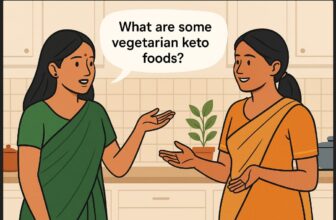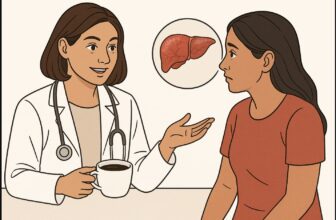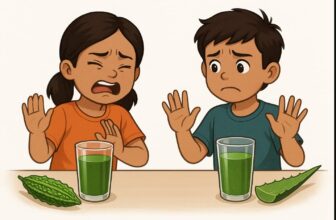Inflammation is a natural immune response that helps the body fight infections and heal injuries. However, chronic inflammation can lead to severe health issues like diabetes, heart disease, arthritis, and even cancer. Your diet plays a significant role in either increasing or reducing inflammation.
In India, modern diets are becoming more processed and high in refined sugars, trans fats, and unhealthy oils, contributing to increased cases of lifestyle diseases. This article explores nine highly inflammatory foods commonly consumed in India, backed by research, and why you should limit or avoid them.
7 Highly Inflammatory Foods You Should Avoid (Backed by Science):
1. Refined Sugar & Sugary Sweets (Mithai, Sodas, and Packaged Juices)
Sugar consumption leads to spikes in blood glucose levels, which trigger inflammation and oxidative stress. High sugar intake also increases the risk of obesity, type 2 diabetes, and heart disease, all of which are rising in India.
Scientific Evidence:
- A study in The American Journal of Clinical Nutrition found that consuming 50 grams of fructose increased inflammatory markers like C-reactive protein (CRP) within hours.
- Excess sugar intake has been linked to insulin resistance and chronic inflammation (Hu et al., 2011)
- Source – https://pmc.ncbi.nlm.nih.gov/articles/PMC4290803/
Common Inflammatory Sugar-Rich Foods in India:
- Mithai (Indian sweets) – Jalebi, gulab jamun, rasgulla, laddoo
- Sugary drinks – Soft drinks, packaged fruit juices, flavored milk
- Bakery products – Cakes, pastries, biscuits with added sugar
Healthier Alternative: Opt for natural sweeteners like jaggery (in moderation) or fresh fruits instead of refined sugar.
2. Processed & Refined Oils (Vanaspati, Sunflower, and Soybean Oil)
Many refined cooking oils used in Indian households are rich in omega-6 fatty acids but lack omega-3s, creating an imbalance that promotes inflammation. Vanaspati (hydrogenated vegetable oil) is particularly harmful due to its high trans fat content.
Scientific Evidence:
- Research published in The Journal of Lipid Research found that trans fats increase tumor necrosis factor-alpha (TNF-α) and interleukin-6 (IL-6), both of which are linked to chronic inflammation.
- A high omega-6 to omega-3 ratio contributes to cardiovascular diseases and metabolic disorders (The Journal of Nutrition).
- Source – https://www.sciencedirect.com/science/article/pii/S2666149724000379
Common Inflammatory Oils in Indian Cooking:
- Vanaspati (Dalda) – Used in commercial sweets, deep-fried snacks
- Refined vegetable oils – Sunflower, soybean, corn oil
- Palm oil – Found in processed snacks and biscuits
Healthier Alternative: Switch to cold-pressed mustard oil, coconut oil, ghee, or olive oil, which have anti-inflammatory properties.
3. Deep-Fried Snacks & Fast Food (Samosas, Pakoras, and French Fries)
Deep-fried foods are loaded with trans fats and acrylamides, which cause oxidative stress and chronic inflammation. Many street vendors reuse oil multiple times, making fried snacks even more harmful.
Scientific Evidence:
- A study in The American Journal of Clinical Nutrition linked fried food consumption to higher levels of CRP, an inflammatory marker associated with diabetes and heart disease.
- Reused cooking oil produces harmful aldehydes, which damage cells and trigger inflammation (Food Chemistry Journal).
- Source – https://pmc.ncbi.nlm.nih.gov/articles/PMC6412032/
Common Inflammatory Deep-Fried Foods in India:
- Samosas, kachoris, bhajiyas, and pakoras
- Chips and namkeens (Haldiram’s, Bikaji, Kurkure, Lays)
- Fast food – Burgers, pizzas, fried chicken
Healthier Alternative: Opt for air-fried or baked versions of your favorite snacks or consume roasted nuts and seeds.
4. Processed Meat (Tandoori Chicken, Salami, and Sausages)
Processed meats are loaded with preservatives, nitrates, and excess sodium, all of which increase inflammation and oxidative stress. High heat cooking methods like tandoori and grilled meats also produce harmful compounds called advanced glycation end-products (AGEs).
Scientific Evidence:
- A study published in Cancer Research found that people consuming high amounts of processed meat had a higher risk of colorectal cancer and cardiovascular disease.
- Processed meats have been linked to increased C-reactive protein (CRP) levels, a key marker of inflammation.
- Source – https://pmc.ncbi.nlm.nih.gov/articles/PMC4698595/
Common Inflammatory Processed Meats in India:
- Frozen sausages, salami, and ham
- Tandoori chicken (cooked at very high temperatures)
- Kebabs from street vendors (often made with poor-quality oils and preservatives)
Healthier Alternative: Choose lean meats like fish and skinless chicken, and opt for home-cooked preparations over processed varieties.
5. Refined Carbohydrates (Maida, White Bread, and Instant Noodles)
Refined grains like maida (white flour) lack fiber, causing rapid spikes in blood sugar, which triggers inflammation and increases the risk of diabetes.
Scientific Evidence:
- A study in The American Journal of Clinical Nutrition linked high-glycemic foods like white bread and pasta to increased inflammation and obesity.
- Source – https://pmc.ncbi.nlm.nih.gov/articles/PMC3257742/
Common Inflammatory Refined Carb Foods in India:
- White bread and bakery items (pav, toast, biscuits)
- Instant noodles (Maggi, Top Ramen)
- Maida-based rotis, puris, and naans
Healthier Alternative: Opt for whole wheat, millet, or multigrain options like ragi, jowar, and bajra.
6. Packaged & Artificially Sweetened Foods (Diet Sodas, Sugar-Free Biscuits)
Artificial sweeteners like aspartame and sucralose disrupt gut bacteria, leading to chronic inflammation and insulin resistance.
Scientific Evidence:
- A study in Nature found that artificial sweeteners negatively impact gut microbiota, leading to increased inflammation and glucose intolerance.
- Source – https://pmc.ncbi.nlm.nih.gov/articles/PMC10144565/
Common Artificially Sweetened Inflammatory Foods in India:
- Diet sodas (Coke Zero, Pepsi Black)
- Sugar-free biscuits and chocolates
- Low-calorie flavored yogurts and protein bars
Healthier Alternative: Choose naturally sweetened options with stevia or jaggery in moderation.
7. Alcohol & Sugary Cocktails
Why It’s Inflammatory:
Excessive alcohol increases gut permeability, allowing harmful toxins to enter the bloodstream and trigger inflammation.
Scientific Evidence:
- Research from The World Journal of Hepatology suggests chronic alcohol consumption contributes to fatty liver disease and inflammation-driven liver damage.
- Source – https://www.sciencedirect.com/science/article/pii/S2949752325000032
Inflammatory Alcoholic Drinks in India:
- High-sugar cocktails (Mojitos, Cosmopolitans)
- Beer and whiskey (high in sugar and calories)
Healthier Alternative: Limit alcohol intake and opt for red wine in moderation for its antioxidant benefits.
Final Thoughts
By reducing these inflammatory foods common in Indian diets, you can improve gut health, reduce the risk of lifestyle diseases, and promote longevity.
Best Anti-Inflammatory Foods for Indians:
- Turmeric, ginger, garlic
- Leafy greens (palak, methi, drumstick leaves)
- Healthy oils (ghee, mustard oil, coconut oil)
- Nuts and seeds (flaxseeds, almonds, walnuts)
Start making small changes today to support a healthier, inflammation-free lifestyle!





